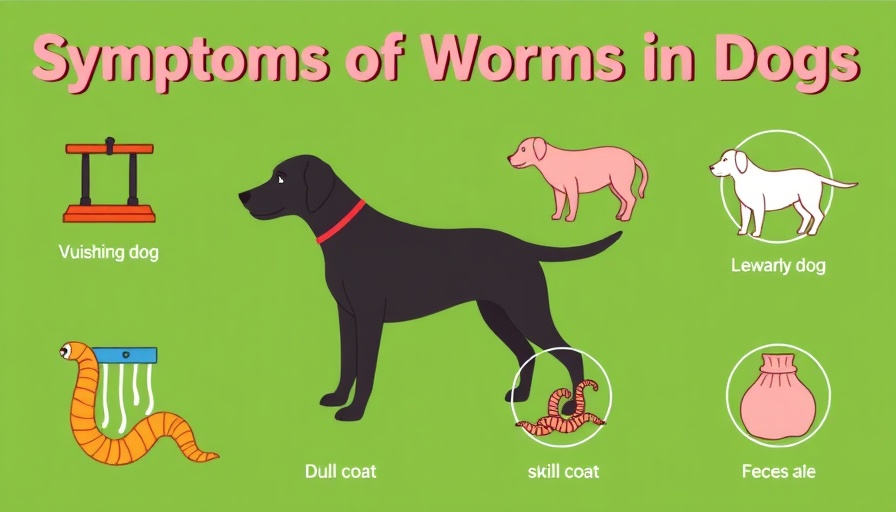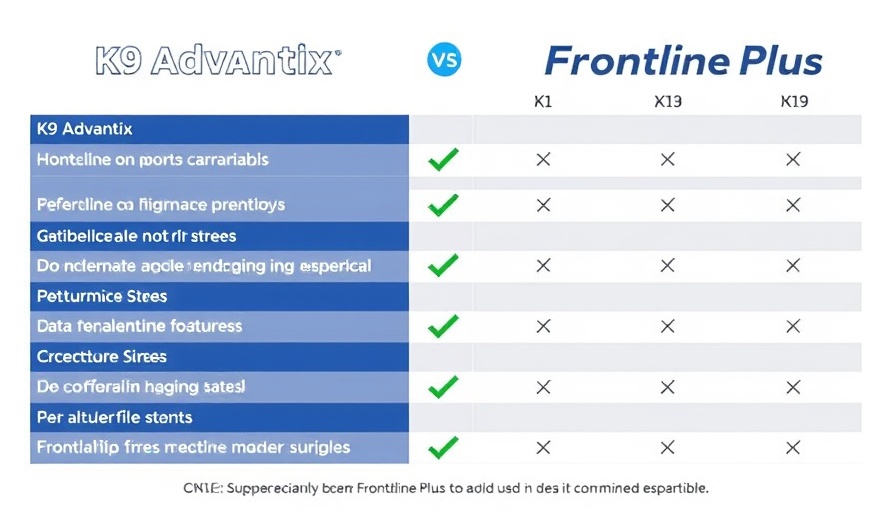
The Hidden Threat: Understanding Worm Infestations in Dogs
Worms in dogs pose a significant risk, particularly to puppies with developing immune systems and older dogs who may have weakened defenses. Without visible symptoms until harm is done, it's crucial for pet parents to understand how these parasites affect their furry companions. Dogs can acquire worms through various means including contact with infected feces, exposure to contaminated soil, and even through flea infestations, highlighting the importance of vigilance in observation and preventive care.
Why Deworming Matters
The significance of deworming goes beyond just keeping your pet safe. Undetected worms can inflict severe internal damage, leading to fatal outcomes if neglected. With symptoms often subtle at first—like lethargy, weight loss, and abdominal pain—it can be easy for dog parents to underestimate the potential threats. Every pet care professional, from veterinarians to trainers, should communicate the critical nature of a sound deworming protocol that can save lives.
How Often Should You Deworm Your Dog?
Understanding the proper deworming schedule is vital for every dog owner. Puppies are particularly vulnerable, requiring their first deworming as early as two weeks of age. The American Kennel Club suggests subsequent remedies every two weeks until they are 12 weeks old and monthly thereafter until six months of age. For adult dogs, the recommendation is once every three months, depending on their lifestyle and risk factors.
The Best Deworming Treatments
Picking the right deworming treatment plays a key role in effectively warding off these parasites. Popular treatments recommended by the vet include:
- Panacur Worming Granules
- Cazitel Flavoured Allwormer
- Antezole Deworming Paste
- Bob Martin Vetcare Dewormer
- Aristopet Allwormers
Each treatment varies in its application and effectiveness, so consulting with a vet can help identify which option works best for your dog's specific needs.
Practical Prevention Tips
Preventing worms in dogs requires a proactive approach. It's not just about regular deworming; there are daily habits pet parents should adopt:
- Routine Veterinary Visits: Regular check-ups help identify potential threats before they become serious.
- Hygiene Maintenance: Consistent grooming ensures fleas—common carriers of worm eggs—are kept at bay. Clean up pet waste to minimize parasite spread.
- Avoid Risky Areas: Choose safe walking locations and steer clear of heavily wooded areas where wildlife may pose a risk of exposure.
- Proper Water Hygiene: Standing water can breed mosquitoes that can carry larvae, so always provide fresh water for your pet.
Engaging Dog Parents and the Right Resources
Educating pet parents is crucial in the fight against worm infestations. By partnering with veterinarians, trainers, and pet advocates, we can strengthen awareness and strategies for effective deworming. Providing brochures or workshops can help disseminate this vital information. Resources like guides on the typical signs of worm infestations can empower every dog parent to be vigilant and proactive.
Common Misconceptions About Worms
There are many myths surrounding worms in dogs that can hinder effective treatment and prevention. One prevalent misconception is that only outdoor dogs are susceptible to worm infestations. In reality, indoor dogs, if exposed to infected fleas or contaminated items, can just as easily contract these parasites. Dispelling these myths can encourage all pet parents, regardless of their dog's lifestyle, to maintain a diligent deworming schedule.
By remaining informed and proactive, dog parents can significantly contribute to their pets' health, ensuring they live long, happy lives free from the threat of worms. For ongoing updates on pet care and health trends, consider subscribing to veterinary newsletters or pet care blogs.
 Add Row
Add Row  Add
Add 




 Add Row
Add Row  Add
Add 


Write A Comment